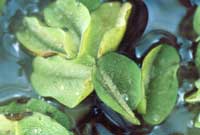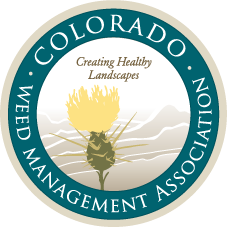Giant Salvinia
Salvinia molesta
Keys to Identification
- Giant salvinia is an aquatic fern that floats on the surface of the water in ponds, lakes, and slow moving creeks. It reproduces by spores.
- It is not known to occur in Colorado at this time but it has been spotted in the past. It is thought that this plant was an accidental introduction to the US through the aquarium trade. It is important to not spread it so cleaning boats and other equipment is an important method of prevention.
Family
True Ferns (Salviniaceae)
Other Names
Kariba weed, African pyle, aquarium watermoss, koi kandy
USDA Code
SAMO5
Legal Status
Colorado Noxious Weed List A
Identification
Lifecycle
Perennial or annual
Growth form
Floating fern, herbaceous forb.
Flower
N/A
Seeds/Fruit
Spores produced in long chains of sporocarps found on the submerged leaves.
Leaves
Upper leaves green with white bristly hairs that are split and resemble eggbeaters. Submerged leaf brown, finely divided.
Stems
Horizontal stems float just below the water’s surface.
Roots
Rootless
Seedling
N/A
Similar Species
Exotics
Salvinia auriculata, S. biloba, S. herzogii
Natives
None
Impacts
Agricultural
Clogs lakes, ponds, streams, irrigation ditches.
Ecological
Forms a dense mat that shades the water. Changes the oxygen content of the water both by preventing surface exchange and decomposing material which accumulates on the bottom surface of the waterbody.
Habitat and Distribution
General requirements
Freshwater lakes, ponds, slow moving streams and rivers. Biomass can double in 7-10 days.
Distribution
Not presently known to occur in Colorado. Found in southern US states.
Historical
Native to South America.
Biology/Ecology
Life cycle
Perennial or annual
Mode of reproduction
Vegetative fragmentation and spores.
Dispersal
Water movement, animals, man, and equipment.
References
Jacono, C.C. The Biology of Salvinia sp., Internet: 7/29/04, Available:http://www.ceris.purdue.edu/napis/pests/gs/facts/bio.html
Jacono, C.C., USGS, Internet: 2/25/03 Available: http://salvinia.er.usgs.gov/html/identification.html


